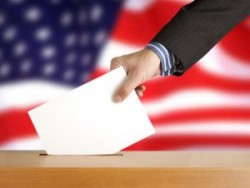By: Daniel Nardini
 You can choose between a Democrat or a Republican. For a good part of our history, we have had two ruling parties—the Democratic Party (founded in 1828), and the Republican Party (founded in 1854). In fact, with few exceptions, we have had only two ruling parties. These have been the only choice for the American people for close to 200 years. These two parties may have had their down periods, but they always seem to be able to come back on top sooner or later. Well, there is a reason for it. No matter how many or how few supporters any candidate of either party may have, if a candidate is on the Democratic Party ticket or on the Republican Party ticket they will have no problem getting on the ballot for whatever election—be it local, state or national level. The Democratic and Republican parties, for all due purposes, have complete control of the electoral process. This is due to the huge funds they have, the corporate donors who invest money in both parties, and also because these two parties have had control of the political process for so long.
You can choose between a Democrat or a Republican. For a good part of our history, we have had two ruling parties—the Democratic Party (founded in 1828), and the Republican Party (founded in 1854). In fact, with few exceptions, we have had only two ruling parties. These have been the only choice for the American people for close to 200 years. These two parties may have had their down periods, but they always seem to be able to come back on top sooner or later. Well, there is a reason for it. No matter how many or how few supporters any candidate of either party may have, if a candidate is on the Democratic Party ticket or on the Republican Party ticket they will have no problem getting on the ballot for whatever election—be it local, state or national level. The Democratic and Republican parties, for all due purposes, have complete control of the electoral process. This is due to the huge funds they have, the corporate donors who invest money in both parties, and also because these two parties have had control of the political process for so long.
Not so with any parties beyond the two ruling parties. The third largest party in the country, the Libertarian Party, has had trouble getting voter access in a number of states. Why? Because either the Democratic or Republican legislators in a number of states require a candidate from a third or fourth party to get on the ballot after getting a certain number of required signatures. The big problem here is that if a third or fourth party does get the required number of signatures, then the Democrats or Republicans change the rules to make it harder. Just last week, the Libertarian Party managed to get the 20,261 signatures needed to remain on the presidential ballot in Pennsylvania for the presidential election this November. Despite repeated Republican Party tactics to block the Libertarian Party from being on the Pennsylvania ballot (largely because Pennsylvania is an important battleground state), a state judge has ruled that the Libertarian Party can remain on the ballot.
Of course, one can argue that the Democratic and Republican parties can raise far, far more money than the Libertarian or Green parties can. That is true. Compared to the two ruling parties, the Libertarian Party and the Green Party are operating on shoestring budgets. That and both ruling parties are making sure that the Libertarian and Green parties do not get their messages out. Both ruling parties did all they could to keep the Libertarians and Greens out of the presidential debates (because of this, a few sponsors of the past presidential debate between Barack Obama and Mitt Romney pulled out). Despite all of the roadblocks put into their way, the Libertarians were able to get their candidate Gary Johnson on the presidential ballot of all 50 states. I am not sure about the Green Party candidate Jill Stein being on the ballot for all 50 states. But it all goes back to my original point that ballot access and trying to make a third or fourth party’s cause known to the American public is extremely difficult. And if Americans do not know that may be there is another choice, is this not another example of voter fraud by the two ruling parties?










Another Kind of Voter Fraud
By: Daniel Nardini
Not so with any parties beyond the two ruling parties. The third largest party in the country, the Libertarian Party, has had trouble getting voter access in a number of states. Why? Because either the Democratic or Republican legislators in a number of states require a candidate from a third or fourth party to get on the ballot after getting a certain number of required signatures. The big problem here is that if a third or fourth party does get the required number of signatures, then the Democrats or Republicans change the rules to make it harder. Just last week, the Libertarian Party managed to get the 20,261 signatures needed to remain on the presidential ballot in Pennsylvania for the presidential election this November. Despite repeated Republican Party tactics to block the Libertarian Party from being on the Pennsylvania ballot (largely because Pennsylvania is an important battleground state), a state judge has ruled that the Libertarian Party can remain on the ballot.
Of course, one can argue that the Democratic and Republican parties can raise far, far more money than the Libertarian or Green parties can. That is true. Compared to the two ruling parties, the Libertarian Party and the Green Party are operating on shoestring budgets. That and both ruling parties are making sure that the Libertarian and Green parties do not get their messages out. Both ruling parties did all they could to keep the Libertarians and Greens out of the presidential debates (because of this, a few sponsors of the past presidential debate between Barack Obama and Mitt Romney pulled out). Despite all of the roadblocks put into their way, the Libertarians were able to get their candidate Gary Johnson on the presidential ballot of all 50 states. I am not sure about the Green Party candidate Jill Stein being on the ballot for all 50 states. But it all goes back to my original point that ballot access and trying to make a third or fourth party’s cause known to the American public is extremely difficult. And if Americans do not know that may be there is another choice, is this not another example of voter fraud by the two ruling parties?